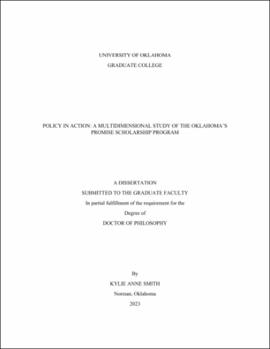| dc.description.abstract | This dissertation offers a multidimensional examination of the Oklahoma’s Promise scholarship, an early commitment financial aid program aimed at improving college access for Oklahoma students. Oklahoma’s Promise, which commits to covering the cost of tuition at in-state colleges and universities, requires students to sign up between the 8th and 10th grades, contingent upon meeting certain eligibility criteria. The dissertation is divided into two essays, each shedding light on critical aspects of program access and implementation. The first essay investigates factors influencing the timing of enrollment in Oklahoma’s Promise. Framed by Perna’s (2006) conceptual model of college choice, this analysis relies on a robust administrative dataset (n=46,824) and descriptive statistics to examine individual-, school- and district-level factors associated with timing of enrollment in the scholarship program. Findings indicate socioeconomic differences in timing of enrollment in Oklahoma’s Promise and reveal that individual and family variables may exert more profound influence on timing of enrollment than school-level or district-level characteristics. This essay contributes to a deeper understanding of the interplay between personal and institutional factors in shaping the development of college predisposition. The second essay investigates administrative burdens within the Oklahoma’s Promise program. Framed by previous research on administrative burdens, street-level bureaucracy, and bureaucratic discretion, this section uses grounded theory methods to analyze open-ended survey responses (n=298) and semi-structured interviews (n=6). Key findings underscore that students must overcome multiple administrative burdens in the form of learning, psychological and compliance costs in their pursuit of the scholarship. Moreover, counselors and other school personnel assume diverse roles in program implementation, spanning information dissemination, compliance enforcement, and advocacy on behalf of students. Notably, findings also highlight the influential role of bureaucratic discretion wielded by counselors to either promote or inhibit access to the scholarship. Ultimately, findings hold significant implications for policymakers, educators, and stakeholders focused on enhancing educational access and equity.
Keywords: financial aid, administrative burden, early enrollment, college access | en_US |

